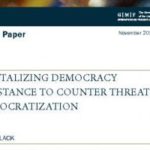 Had Ronald Reagan’s Westminster speech merely articulated the case for democracy, it would be remembered as one of many well-written and inspiring presidential addresses. It was, on the contrary, much more: It represented a plan of action, a strategy to establish the infrastructure of democracy, notes Richard Fontaine, the chief executive officer of the Center for a New American Security (CNAS).
Had Ronald Reagan’s Westminster speech merely articulated the case for democracy, it would be remembered as one of many well-written and inspiring presidential addresses. It was, on the contrary, much more: It represented a plan of action, a strategy to establish the infrastructure of democracy, notes Richard Fontaine, the chief executive officer of the Center for a New American Security (CNAS).
The institutions to which his speech gave rise—the National Endowment for Democracy, the International Republican Institute, the National Democratic Institute, Center for International Private Enterprise, and the Solidarity Center—endure to this day, and their work around the world remains vital, he writes for the American Interest.
 But they now operate on sharply contested terrain, Fontaine adds. China is deploying what the National Endowment for Democracy terms “sharp power,” designed to “pierce, penetrate, or perforate the information and political environments in the targeted countries.” Beijing is building political influence in target countries and constructing an expansive, illiberal sphere of influence that is hostile to U.S. leadership.
But they now operate on sharply contested terrain, Fontaine adds. China is deploying what the National Endowment for Democracy terms “sharp power,” designed to “pierce, penetrate, or perforate the information and political environments in the targeted countries.” Beijing is building political influence in target countries and constructing an expansive, illiberal sphere of influence that is hostile to U.S. leadership.
As The Economist explained, CNN’s Fareed Zakaria observes, that meant leveraging economic weight to influence lawmakers and suppress criticism abroad. (As an example, the magazine pointed to China’s economic punishment of Norway after a pro-democracy Chinese activist won a Nobel Prize.) China is still at it, and Drew Thompson writes for the South China Morning Post of a growing backlash.
 We’re underestimating China’s impact on governance in Latin America, the NED’s Jessica Ludwig contends. Largely absent from the conversation on China’s influence has been a dedicated look at the normative impact of relations with Beijing on governance—and whether closer relationships with China’s party-state authorities affect democracy in the region, she adds, highlighting three persistent myths in the latest issue of Global Americans.
We’re underestimating China’s impact on governance in Latin America, the NED’s Jessica Ludwig contends. Largely absent from the conversation on China’s influence has been a dedicated look at the normative impact of relations with Beijing on governance—and whether closer relationships with China’s party-state authorities affect democracy in the region, she adds, highlighting three persistent myths in the latest issue of Global Americans.
To push back against such authoritarian influence, the United States should make existing democracies more resilient, protect and support fragile democracies, and expand democratic choice in countries where it is today unknown, adds Fontaine, former foreign policy advisor to Senator John McCain:
- The top priority should be to make open societies more resilient and capable of defending themselves against external threats. During the Cold War, U.S. grand strategy revolved around protecting democratic strongpoints in Asia and Europe. Today, the United States must first defend itself against autocratic penetration and subversion, while also looking to protect allies and partners. ….
 The second priority should be to protect fragile nascent democracies—countries that have recently democratized but where democracy is still under assault from internal or external forces. Ukraine is an important example: Both its government and a majority of its population support democratic consolidation and integration into the West, yet Moscow is pursuing hybrid war to subvert the country’s sovereign institutions. Other important fragile democracies include Bangladesh, Georgia, Indonesia, Malaysia, Nigeria, Ethiopia, Armenia, and Tunisia…
The second priority should be to protect fragile nascent democracies—countries that have recently democratized but where democracy is still under assault from internal or external forces. Ukraine is an important example: Both its government and a majority of its population support democratic consolidation and integration into the West, yet Moscow is pursuing hybrid war to subvert the country’s sovereign institutions. Other important fragile democracies include Bangladesh, Georgia, Indonesia, Malaysia, Nigeria, Ethiopia, Armenia, and Tunisia…- The third priority should be encouraging democratic openings in autocratic environments. Washington may lack the leverage to mitigate repression in countries such as China, Iran, North Korea, and Russia, but there are other places where democratic practice may find more fertile ground, including Angola, Belarus, Central Asia, and Sudan….
 Finally, we should take a page from Reagan’s playbook when it comes to questions of sequencing and pragmatism. To promote democratic values is not to call for immediate elections everywhere, even when the exercise of such franchise is likely to bring into power an illiberal regime. “One man, one vote, one time,” is not democracy. At Westminster, Reagan asked “only for a process, a direction, a basic code of decency, not for an instant transformation’………………RTWT
Finally, we should take a page from Reagan’s playbook when it comes to questions of sequencing and pragmatism. To promote democratic values is not to call for immediate elections everywhere, even when the exercise of such franchise is likely to bring into power an illiberal regime. “One man, one vote, one time,” is not democracy. At Westminster, Reagan asked “only for a process, a direction, a basic code of decency, not for an instant transformation’………………RTWT
This is the third in a series of three essays, commissioned by the Ronald Reagan Presidential Foundation and Institute, examining the legacy of Reagan’s Westminster Speech and its relevance for democracy promotion today. Read the first installment by Carl Gershman here. The second, by Daniel Twining, is here.







